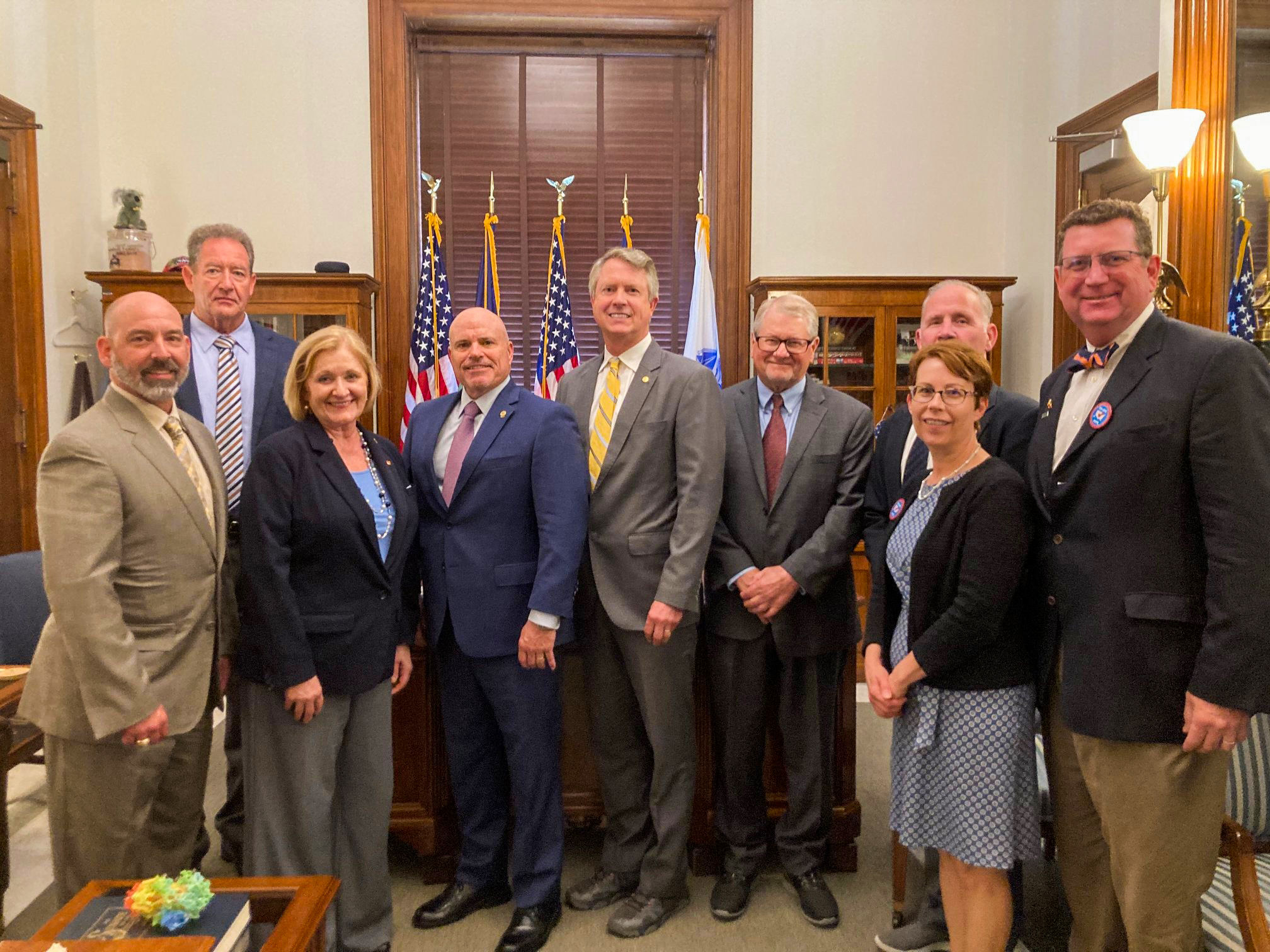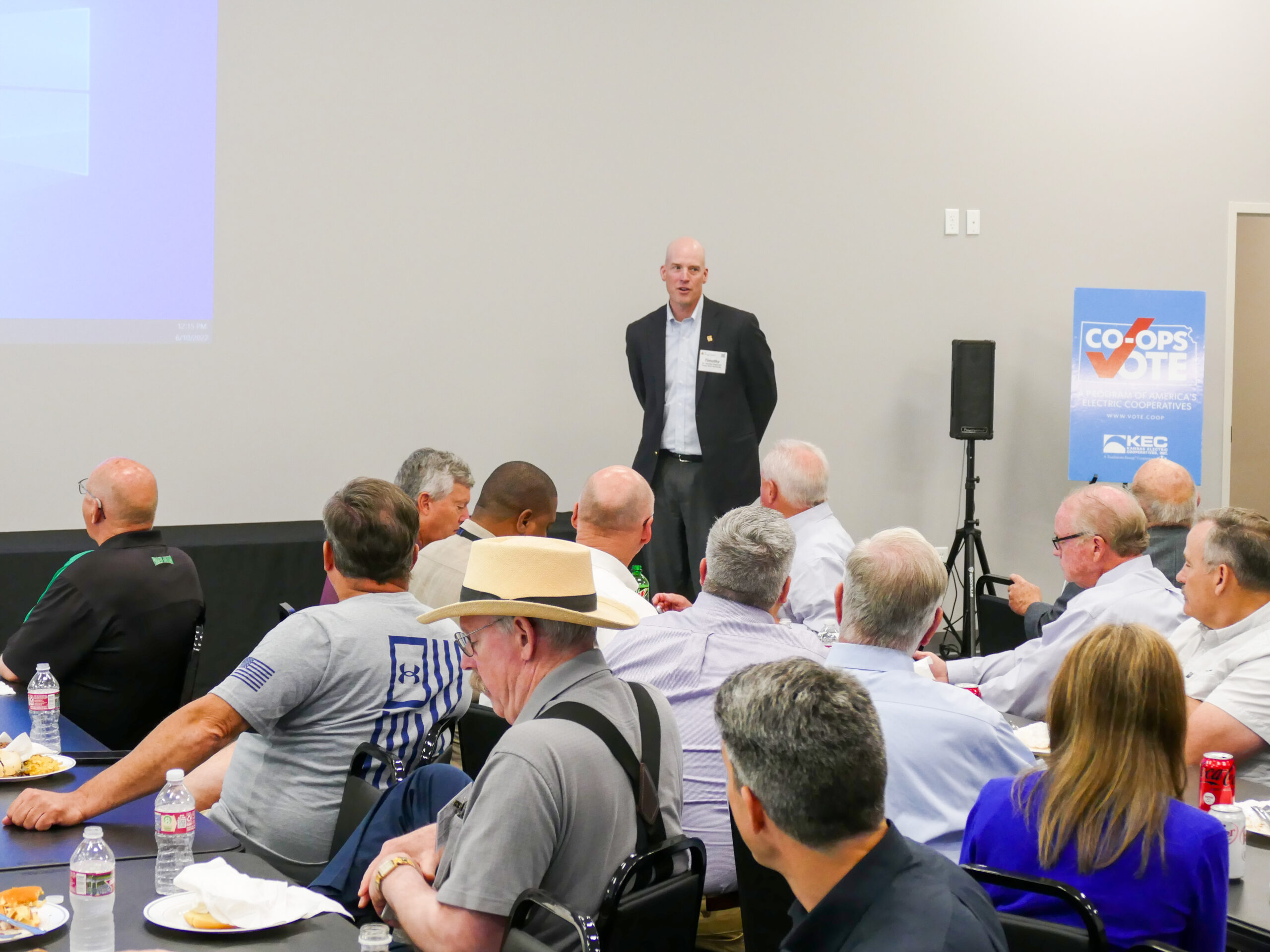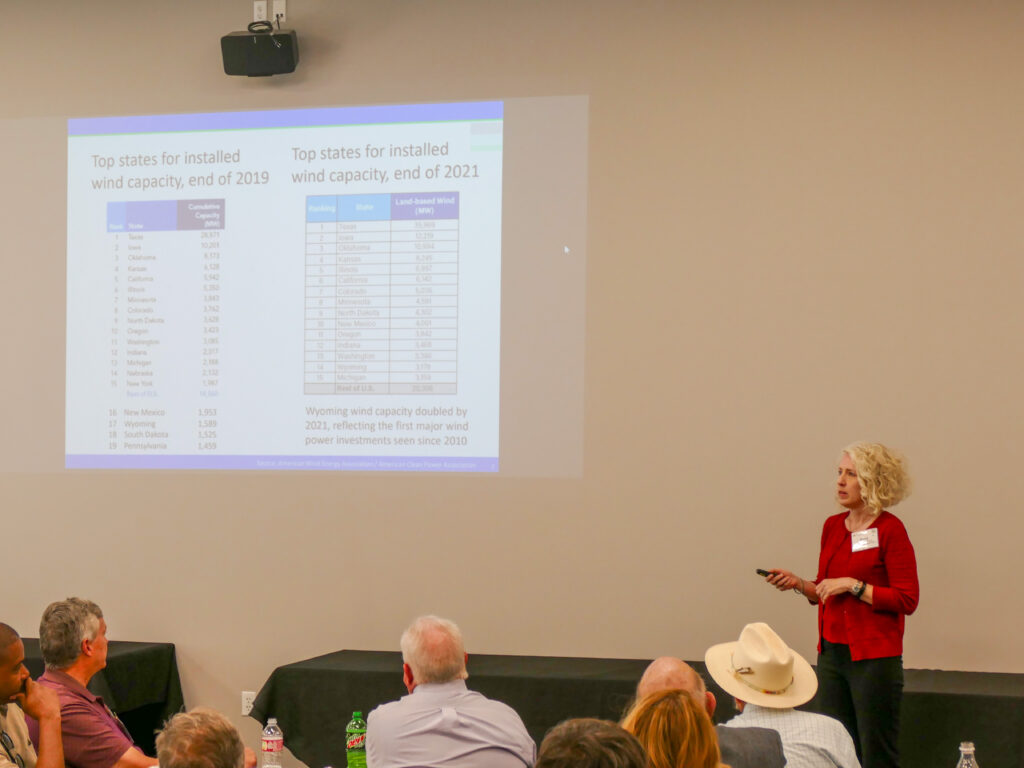A Moment with the CEO
BY SUZANNE LANE

It’s officially summertime in Kansas. As all Kansans can attest, summer not only brings mosquitoes and heightened chances of severe weather, but it brings the discomforts associated with extreme heat and humidity as well.
When it’s hot and humid outside, homes and businesses generally use more power and, therefore, place a higher demand on the regional electric grid and the generation resources that ultimately serve Kansans’ electricity needs.
For the first half of June, spot market pricing for natural gas was $8.00/MMBtu or greater. Dramatic increases in liquified natural gas (LNG) exports related to the war in Ukraine and below average storage injections for use this winter were the primary causes of these extreme prices. More recently, prices have come down to about $6.00/MMBTU due to an explosion at a key export terminal in Texas. The reduced export capability is making more gas available to the domestic market and increasing storage injections. Even at current levels, gas prices are about 75% higher than one year ago. While we are glad to see some relief in pricing, natural gas volatility will continue to be a key driver for energy prices in the SPP.
One additional challenge this summer has been related to coal deliveries and pricing. A tight labor market for both coal mine and rail, the impacts of increased coal exports to Europe, and transportation issues are creating pressure on this historically stable fuel source. While area coal plants—including KEPCo’s co-owned coal unit, Iatan 2—currently are not concerned about coal supply for the summer, it’s the winter season and beyond that the industry is focused on.
Overall, however, KEPCo’s owned and purchased resources, which include the diverse mix of coal, nuclear, natural gas, hydro, solar, and wind, should limit KEPCo’s exposure to these increased pricing and supply pressures. One of the keys to mitigating risk involves reliable operations of our resources; KEPCo and its partners have worked diligently to assure all of our resources remain as reliable and ready for operation as possible.
Dependable resources and the fact we have an overall diverse generation portfolio are once again providing valuable insulation from the extreme cost and reliability challenges that unfortunately are plaguing some parts of the country. Thanks to the foresight of our past and present Board of Trustees and employee team, KEPCo has not only created a diverse power supply portfolio, but we continue to keep resource diversity and fuel certainty at the forefront of our purpose of providing safe, reliable, economical, environmentally responsible power to our members.
KEPCo Institutes New Load Management Tools
KEPCo has selected AccuWeather for Business (AccuWeather) as its source for weather data to be utilized during the 2022 load management season. KEPCo selected AccuWeather due to the simplified data integration with the KEPCo Load Management website. Other features of the service include a measure of forecast uncertainty, customizable portal dashboards, and lower cost for these services.
“KEPCo recognizes the importance of Load Management in controlling KEPCo’s costs and welcomes opportunities to improve the program. KEPCo anticipates the additional information and capabilities provided by AccuWeather will improve the program, while reducing costs,” said Mark Barbee, KEPCo SVP & COO.
In addition, KEPCo staff revamped the Temperature & Load Notification page, which now will include an improved summary of relevant historical load data and enhanced load forecast data. The formatting of the page has been improved as well, providing a simpler pathway to necessary information.
KEPCo Selects Summer Intern

LUKE KRAMER, the son of Gerard and Colleen Kramer, has been selected as the 2022 Stephen E. Parr Summer Engineering Intern. Luke began his internship on May 23.
He graduated from Hayden High School, Topeka, in 2019, and will be starting his senior year at Kansas State University (KSU) in the fall. Luke is majoring in electrical engineering, with a minor in physics.
Luke has one brother and two sisters. In his spare time, Luke participates in the KSU fencing club and enjoys watching movies and playing video games.
Generating Safety
Summer Safety Tips

With summer upon us, it is important to take precautions as more time is spent outdoors. The following tips will help keep us safe and healthy as we enjoy summertime activities.
- Hydrate: To prevent dehydration, water is the best drink of choice. Don’t wait until you are thirsty. Drink plenty of water before, during, and after activity, especially in warm weather. Avoid too much alcohol and caffeine. Eat fruits and vegetables which have a lot of water content, such as watermelon, strawberries, grapefruit, peaches, eggplants, and spinach.
- Protect your skin: Use high SPF sunscreen to protect against sunburn. Reapply sunscreen often, especially if you are sweating or doing activities in the water. Stay in the shade during peak hours (11 a.m. to 4 p.m.). Keep children in the shade as much as possible. Cover your skin and wear a hat.
- Pace yourself: Limit physical activity during the hottest peak hours of the day to reduce risk of heat exhaustion and heat stroke. Get used to the hot weather by slowly increasing the time spent outside.
- Keep cold food cold: Food poisoning increases during summer months due to warmer temperatures, which enables foodborne germs to thrive. Each year, one in six Americans get sick from eating contaminated food. Keep food in a cooler or refrigerator prior to and after serving.
- You’re bugging me: Protect yourself and your family from insect bites by using Environmental Protection Agency registered insect repellents with active ingredients such as DEET. Apply repellents only to exposed skin or clothing, as directed on the product label, and always follow instructions when applying insect repellent to children.
KEPCo Attends NRECA Legislative Conference

A contingent of 16 Kansas electric cooperative representatives attended the NRECA Legislative Conference in Washington, D.C., on May 1-3.
Phil Wages, Director of Member Services, Government Affairs, and Business Development, represented KEPCo at the conference.
Issues discussed with the Kansas delegation included:
- Direct Pay Tax Incentives for Energy Innovation – Electric cooperatives are committed to meeting future energy needs but often are limited by the tax code and high costs associated with implementing new technologies. Our request was for Congress to allow co-ops to take advantage of incentives through direct pay tax credits to jump start carbon capture technology, keep existing nuclear plants online, develop renewables and battery storage systems, and expand transmission capacity.
- Federal Infrastructure Funding – Congress passed the Infrastructure Investment and Jobs Act, which includes billions of dollars for broadband deployment, electric vehicle infrastructure, cybersecurity, grid resiliency, clean energy development, carbon capture, storage and use, and energy research, design, and development programs. The law offers historic opportunities for electric co-ops to meet these important infrastructure and technology challenges. We asked that Congress continue to support co-op efforts to access infrastructure funding opportunities as they are made available.
- H.R. 2244/S. 978 – The Federal Financing for Rural America Act – The majority of electric cooperatives use financing from the U.S. Department of Agriculture’s Rural Utilities Service (RUS) Electric Loan Program to support the delivery of affordable, reliable electricity. Most RUS loans cannot be refinanced to take advantage of lower interest rates without paying a penalty. Nationally, the refinancing of RUS electric loans could save co-ops billions of dollars over the life of their outstanding loans. Our request was for Congress to enact the Flexible Financing for Rural America Act to allow co-ops to refinance RUS loans without penalty when economic conditions are favorable. Each member of the Kansas delegation is a co-sponsor of this Act.
- Southwestern Power Administration Fund Establishment Act, S. 3719 – This bill was introduced by Senator Jerry Moran (R-KS) and would ensure that the Southwestern Power Administration (SWPA) has a stable funding source, which will facilitate better planning, drought response, and capital investments for federal transmission and hydropower assets. A self-financing funding model will take the Bureau of Reclamation’s Hydropower Program off appropriations and move it to a mandatory revolving fund, thus allowing SWPA to operate off a reserve balance from power sales. This move would resolve the shortfall SWPA faces in funding authority for its Purchase Power and Wheeling needs. Our request was to have Congress pass S. 3719 in order to slow the erosion in appropriated dollars that threatens the reliability of the federal power system.
Subsequent to our visit, Senator Roger Marshall (R-KS) became a co-sponsor of S. 3719.
Kansas Utilities Meet with The Energy Council
Dr. Timothy Fitzgerald shares perspectives on the wind industry at The Energy Council’s annual meeting in Overland Park.

In June, The Energy Council held its annual conference in Overland Park. As part of the agenda, Kansas electric, natural gas, transmission, and municipal utilities welcomed over 50 members of The Energy Council to Kansas by treating the members to lunch and presentations at 4 Rivers Electric Cooperative, followed by a tour of Wolf Creek Generating Station. Phil Wages attended the meeting at 4 Rivers on behalf of KEPCo.
The Energy Council is a non-partisan legislative organization founded in 1975. The original five member states (Louisiana, Arkansas, Oklahoma, Texas, and New Mexico) were located within the same region, and the group was initially known as the Southwest Regional Energy Council. The organization was formed to provide a forum for producing state legislators interested in energy policy. The Council is focused on developing a better understanding of energy markets, technology, and policy, as well as addressing related environmental concerns, which benefits lawmakers and their constituents. Today, there are 14 member states, adding West Virginia, Mississippi and Alabama to the east, and Colorado, Kansas, Montana, North Dakota, Wyoming, and Alaska to the west. In recognition of the continental nature of energy markets, the Council has welcomed the Canadian Provinces of Alberta and Saskatchewan. The Council allows legislative policymakers to maintain a dialogue and learn more about energy issues of importance to their states, citizens, environment, and revenue base.
Senators Dan Kerschen and Carolyn McGinn and Representatives Kyle Hoffman and Joe Seiwert represent Kansas on The Energy Council Executive Committee.

Ms. Choquette details wind development by The Anschutz Corporation at The Energy Council’s annual meeting.

